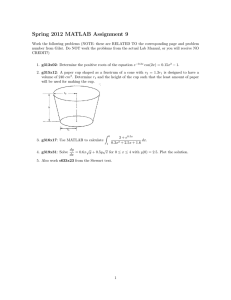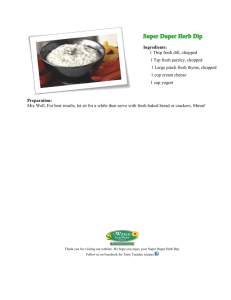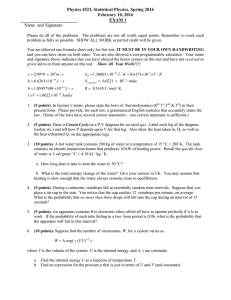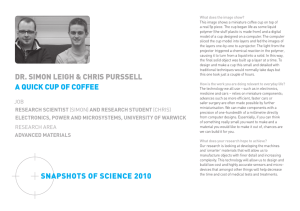Nourishing the Next Generation Practical advice for caring for your
advertisement
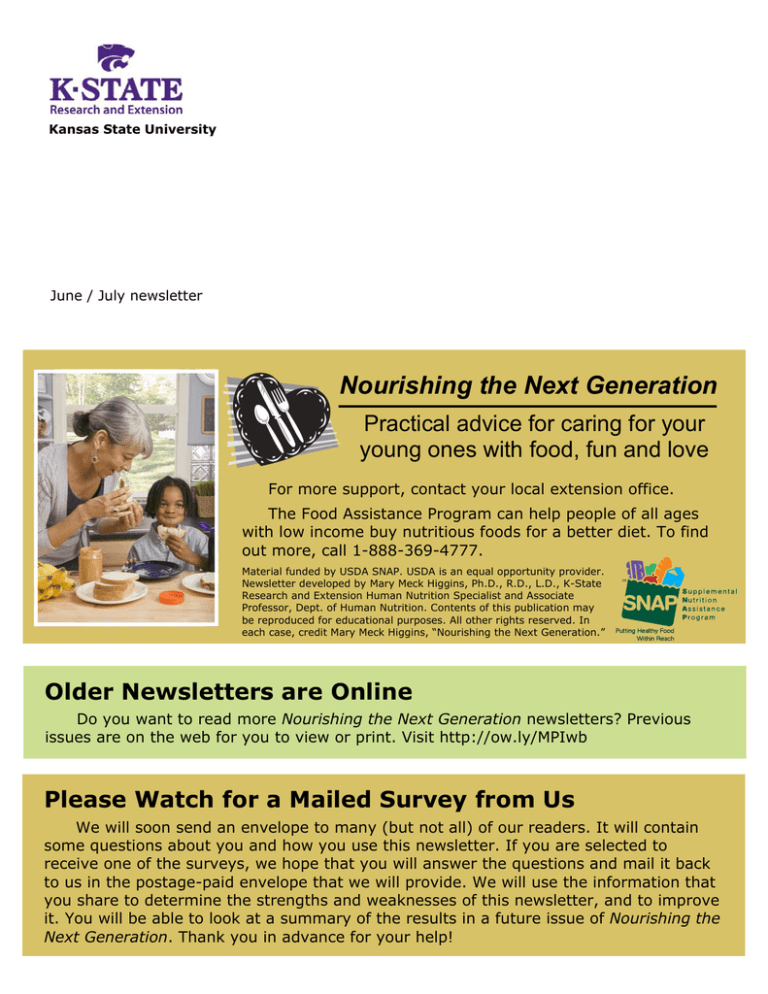
Kansas State University June / July newsletter Nourishing the Next Generation Practical advice for caring for your young ones with food, fun and love For more support, contact your local extension office. The Food Assistance Program can help people of all ages with low income buy nutritious foods for a better diet. To find out more, call 1-888-369-4777. Material funded by USDA SNAP. USDA is an equal opportunity provider. Newsletter developed by Mary Meck Higgins, Ph.D., R.D., L.D., K-State Research and Extension Human Nutrition Specialist and Associate Professor, Dept. of Human Nutrition. Contents of this publication may be reproduced for educational purposes. All other rights reserved. In each case, credit Mary Meck Higgins, “Nourishing the Next Generation.” Older Newsletters are Online Do you want to read more Nourishing the Next Generation newsletters? Previous issues are on the web for you to view or print. Visit http://ow.ly/MPIwb Please Watch for a Mailed Survey from Us We will soon send an envelope to many (but not all) of our readers. It will contain some questions about you and how you use this newsletter. If you are selected to receive one of the surveys, we hope that you will answer the questions and mail it back to us in the postage-paid envelope that we will provide. We will use the information that you share to determine the strengths and weaknesses of this newsletter, and to improve it. You will be able to look at a summary of the results in a future issue of Nourishing the Next Generation. Thank you in advance for your help! Nourishing the Next Generation Practical advice for caring for your young ones with food, fun and love Thirsty? Make the Best Beverage Choices Often Offer plenty of liquids throughout the day to stay hydrated, especially when the weather is hot. What you and your grandchild drink matters—for your wallet and health! With meals, as well as between meals, most of the time offer plain cool water. Preferably, choose tap water and drink from reusable containers. Or, flavor plain water by adding slices of lemon or cucumber, or a small splash of 100% juice. In addition to water, all family members are advised to drink 2 to 3 cups, depending on their age, daily of fat-free or low-fat milk or a milk alternative. When buying beverages at the store, look at the Nutrition Facts label to choose ones with no or few calories, fats or sugars. If you do select a beverage high in calories, fats or sugars, keep the portions small. Source: www.ChooseMyPlate.gov “Making meals and memories together” Nutty Cole Slaw with Peaches Makes 8 servings, each about 3/4 cup Ingredients: 15 ounces canned sliced peaches (or 1 cup fresh or frozen) 1/4 cup natural-style peanut butter 1/4 cup unsweetened lime or lemon juice 2 tablespoons canned peach syrup OR light agave syrup OR sugar 2 teaspoons reduced-sodium soy sauce 1/4 cup chopped fresh cilantro leaves (optional) 14 ounces bagged “coleslaw mix” (containing fresh shredded green and red cabbage and carrots) Directions: 1. Wash your hands and work area. 2. Drain peaches, reserving 2 tablespoons of the peach syrup. Cut each slice into about 4 pieces. (Or use 1 cup mango chunks instead.) Set aside. 3. In an 8-cup shallow dish with a lid, mix together peanut butter, juice, syrup, soy sauce and cilantro well. 4. Gently stir in peaches and shredded vegetables until coated. (Instead of the coleslaw mix, you may use 2 cups, packed, shredded fresh bok choy or green cabbage; 1 cup, packed, shredded fresh red cabbage; and 1 cup, packed, shredded fresh carrots.) 5. Cover and refrigerate for at least 30 minutes to allow the flavors to blend. 6. Serve cold. 7. Cover and refrigerate leftovers within two hours. Nutrition Facts per 3/4 cup: 100 calories, 4g fat, 0.5g saturated fat, 0g trans fat, 0mg cholesterol, 95mg sodium, 14g carbohydrate, 2g dietary fiber and 3g protein. Daily Values: 30% vitamin A, 30% vitamin C, 2% calcium and 2% iron. Kansas State University Agricultural Experiment Station and Cooperative Extension Service, Manhattan, KS. K-State Research and Extension is an equal opportunity provider and employer. Kansas State University, County Extension Councils, Extension Districts and the U.S. Department of Agriculture Cooperating.

